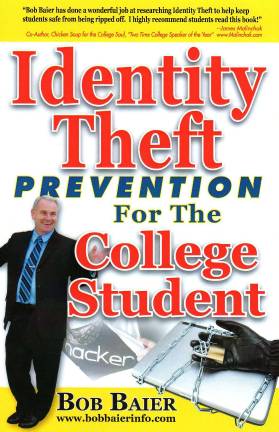Identity theft

WARWICK — The recent rash in the breach of consumer data that began with Target Corporation and Neiman Marcus during the holiday season and most recently the Yahoo customer database and others may be just the tip of the iceberg.
That message, according to Warwick resident Bob Baier (pronounced buyer), needs to be brought to everyone's attention.
Baier is a forensic document examiner who testifies in court regarding forgeries and also trains Orange County law enforcement in seven different areas, one of which is identity theft.
He is also the author of "Identity Theft Prevention for the College Student," a publication that offers practical and useful tips that everyone, especially students living away from home, should follow to stay safe.
Vigilance is needed
"There's a credit card theft underworld, mainly in Russia and Eastern Europe" said Baier, "and they are getting more sophisticated every day."
He reported that credit card companies plan to discontinue the easily compromised magnetic stripe system and move to the more secure chip and PIN payment system, but until that time vigilance is the primary defense.
"The sooner you find out you have become a victim," said Baier, "the easier it will be and the less number of hours it will take trying to straighten everything out."
He also warned that every Web site you visit, every image you download and every email you send, all connected to your IP address, can be an open invitation for identity thieves to invade your privacy. Children are also more likely to be victims of identity theft than adults.
Social media
"Thieves love the fact that a child's social security number will have no credit history," said Baier. "And keep in mind, that the children are often using a parent's computer, which is where sensitive information about banking and credit cards may be found."
The crooks, he added, can also obtain a wealth of information from social media like Facebook where people often list their home addresses and even travel reports and photos, which basically tell everyone," We're not at home and we're far away."
And file-sharing networks, commonly known as peer to peer, allow users the ability to download software that essentially opens their computer to other users looking to share information such as music and games. But they can also inadvertently expose the contents of entire hard drives including tax returns, passwords and important account numbers.
One of the fastest growing crimes in the United States is identity theft and college students are easy "marks."
In "Identity Theft Prevention for the College Student," Baier explains the seven most important things you need to know to prevent identity theft. The information is especially helpful for college freshmen.
Essential information
To receive a free 30-day program sheet outlining what should be done to help keep you safe from identity theft, the FBI latest scams, what to do if you become a victim or to order a copy of Baier's book go to www.bobbaierinfo.com and click on Identity Theft.